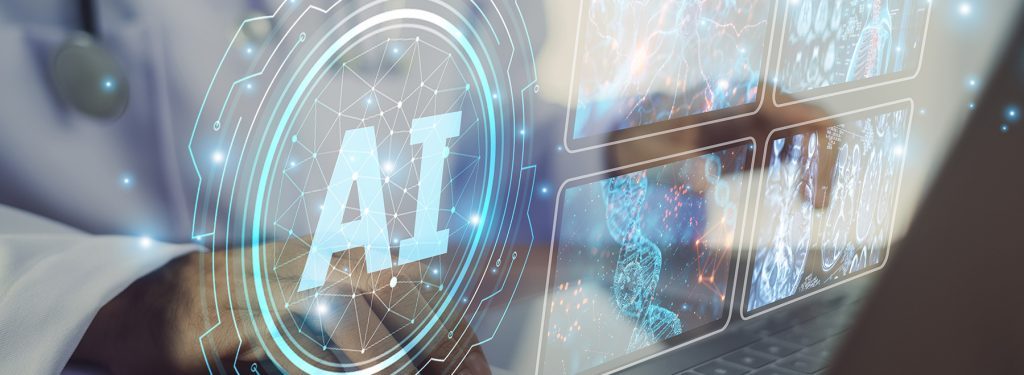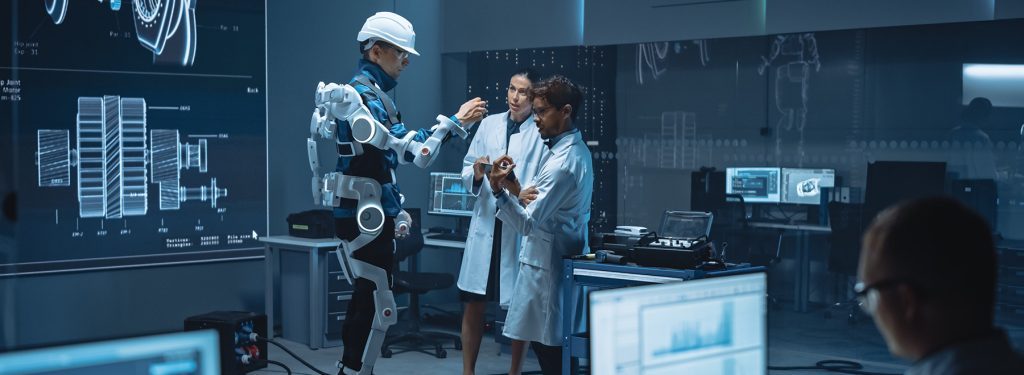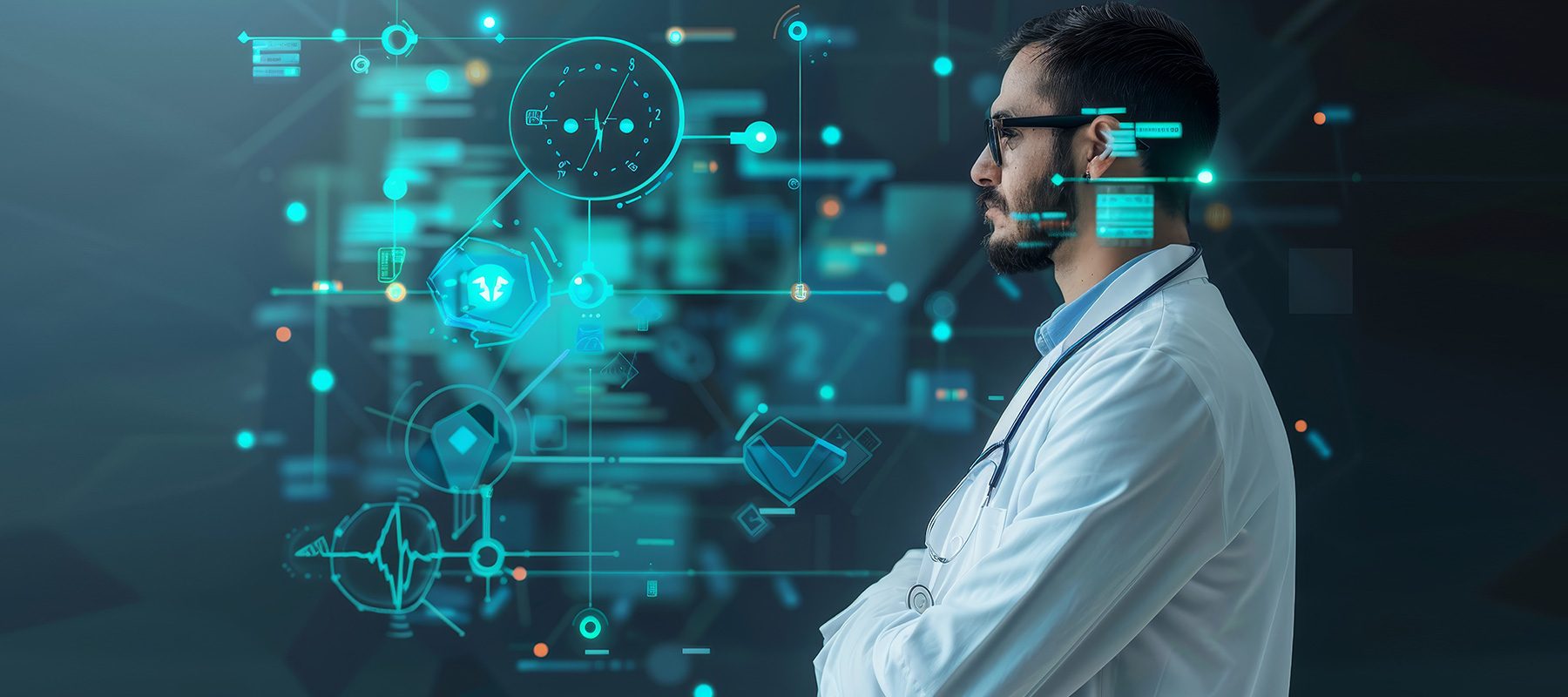Artificial Intelligence (AI) has been committed to bringing so many positive changes in the healthcare sector. As AI technologies progress, new AI healthcare applications are launched daily to enhance medical facilities. AI has been accelerating medical facilities daily, from helping with early diagnosis to discovering new medicines.
Overall, AI has the potential to transform healthcare. According to research, AI can help doctors create personalized treatment plans for patients with different health conditions. Hence, the future of AI in healthcare is revolutionary.

An AI algorithm that can spot subtle signs of abnormalities in a patient’s body could be a significant example. If you want to know more, let’s engage in a fruitful discussion regarding AI’s bright and promising future in saving lives.
What’s the future of AI in Healthcare?
Healthcare is a big industry that will keep evolving with time. According to a recent survey report, the future worth of the global healthcare industry can reach $500 billion. Artificial Intelligence will serve a pivotal role in the advancements of this evolving healthcare industry. According to the research predictions, AI will take over the diagnosis sooner or later. Beyond the diagnosis, AI has some other major contributions to the future of healthcare, such as
Data analysis will be done using AI:
Data analysis refers to the scientific process of collecting and analyzing massive data sets. In the healthcare industry, data analysis plays a huge role. A set of rightly analyzed data can enhance the overall healthcare facilities. Everything comes under data analysis, from collecting patients’ feedback to analyzing the effect of a particular treatment plan.

Research evidence on the future of AI in healthcare has shown that AI can effectively speed up this entire data analysis process. Automation is one of the key features of AI that can smoothen this process. AI can easily handle multiple data-analyzing tasks, from helping track records to following up on the progress caused by a specific treatment.
AI will assist medical staff in emergencies:
The emergency department of a hospital plays a pivotal role in saving people’s lives. Even a minor error in the emergency unit can take a precious life. Sometimes, the Emergency unit’s staff and the ER doctors handle multiple patients simultaneously in an emergency unit. In such a situation, doctors need to make rapid decisions.
According to a recent survey report, AI can make this emergency decision-making process easier and flawless.
AI may detect the symptoms of heart diseases via phone:
AI can offer a quick and trustworthy diagnosis when a diagnosis goes wrong and is delayed. There is already an AI tool named Corti that involves machine learning while assessing a patient’s symptoms. The assessment is done via a voice call where the patient describes their symptoms. This AI tool can detect all background noises.
Researchers have stated that this AI tool can successfully detect heart attack symptoms. The accuracy rate is 95%. Research reports suggest that the efficiency of AI tools in detecting symptoms will improve greatly within the coming 7-8 years.

How can using AI in healthcare save lives?
Furthermore, AI has great potential to save a patient’s life. Beyond diagnosis and analysis, AI has more to offer. Let’s discuss this transformative technology called Artificial Intelligence and its power to save people’s lives.
Ai helps in discovering new effective medicines:
Do you know there is still a huge need for some lifesaver drugs? Fortunately, AI is showing a bright future in drug discovery. Evidence even suggests that vaccines for Coronavirus were discovered and prepared with the help of AI.
From speeding up the discovery process to revealing new biological potentials, AI is doing wonders regarding drug discovery and medical experiments.
Ai is assisting in cancer detection and cancer treatment plans:
Very few people are aware that AI can detect the symptoms of cancer. Furthermore, AI has recently discovered an advanced anticancer molecule that can strengthen the T cells to fight against cancer cells.

AI can also potentially assess how a cancer patient responds to immunotherapy. That’s not all; AI also greatly contributes to building effective cancer treatment plans. Today’s oncologists have already started using AI to predict patient recovery chances. Researchers hint that AI technologies will improve daily and help discover cancer medicines and treatment plans.
Ai is minimizing the risk of blood infections in a patient:
Do you know the reason behind comorbidity? It’s a blood infection that’s hard to spot and treat. However, AI is showing hope for Ray with its potential to detect patients with a blood infection.
By using medical history, previous diagnoses, and present symptoms, AI applications can identify patients at risk of developing a blood infection. The accuracy rate is near 80%. Such early diagnosis helps doctors prepare an effective medical plan for the patients. So, when it comes to the future of AI in healthcare, researchers expect more usage of AI in saving precious lives.
Sooner or later, AI robots will do the surgery:
We hope you are aware that AI robots are already assisting doctors in completing complicated surgeries. Involving an AI robot in such complicated surgeries can improve the success rate, minimize the risk of errors, and speed up the entire procedure.
The research report shows that, sooner or later, robot surgery will be an accessible and reliable procedure in the medical area. With the improvements in AI technology, robots will soon perform surgeries completely and efficiently.

Final Take
After a fruitful discussion, it’s easy to conclude that AI has a promising and sustainable future in health care. As advancements continue to unfold, AI technologies will become stronger.
With the collaboration of doctors and AI, providing better health facilities will be easier.
Also, from redefining the potential of the right medication to assisting healthcare professionals, the future of AI in healthcare is clear, promising, and secure.
For insightful health and wellness content, keep following World of Heal! Looking for guest posting opportunities? Contact us at affiliates[@]prasarnet[.]com for more information.

Vicky collaborates closely with doctors, scientists, and professionals in the medical and pharmaceutical industries. Having worked with SBU Community Clinic in the USA, he is dynamic in writing and publishing health-related guest blogging services, offering valuable insights in the healthcare field.









